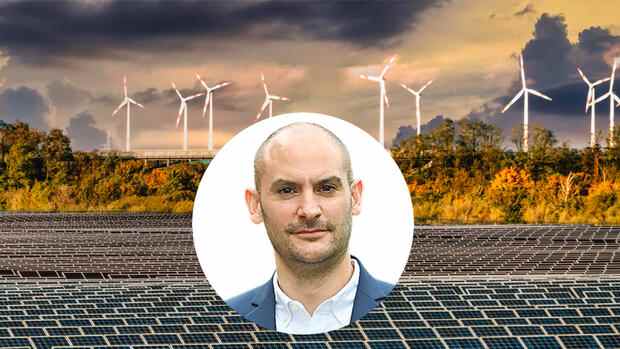The author is Finance Minister of Baden-Württemberg (Bündnis 90/Die Grünen).
(Photo: Imago, Getty)
The Russian war of aggression and its serious consequences are currently suppressing issues that are crucial for the prosperity of future generations. It’s about climate protection and the reform of our social security systems – especially pension schemes. Both can have more to do with each other than it appears at first glance.
We only had to experience the fact that the climate crisis is getting worse again this summer with its long drought phase. Extreme weather events such as heavy rainfall are also increasing.
The costs of the consequences of the climate crisis are increasing – as are the costs for the social security systems: According to the Federal Court of Auditors, federal spending will gradually increase from around 121 billion euros in 2019 to 454 billion euros in 2060. As a result of demographic change, there will be two employed persons for every person of retirement age. There are currently three.
Baden-Württemberg’s pension funds are geared towards sustainability
Both climate protection and old-age provision are about intergenerational equity. If we don’t change course now, future generations will feel the consequences massively.
Top jobs of the day
Find the best jobs now and
be notified by email.
For climate protection and social security, we need more government investment. It won’t work without her. But the pandemic, the energy crisis and the necessary investments in the Bundeswehr are further restricting the state’s financial leeway.
That is why we also need private capital. It is crucial that we give this capital a direction. The instruments and levers for this are known and must be used consistently.
The first lever is a classic example of functioning regulatory policy, the CO2 price. The noticeable increase in the costs of CO2 emissions creates strong incentives for companies to invest in more climate-friendly production processes.
Every gram of CO2 emissions avoided lowers your costs. From this point of view, the suspension of the increase in the CO2 price as part of the third relief package was not a good signal for a policy that is fair to the generations.
The second lever is the financial and capital markets. The state of Baden-Württemberg is leading the way here: the state has been issuing green bonds on the capital markets since 2021.
>>Read here: The stock market craves even more sustainability
This is used to finance ecologically sustainable projects that are important for climate protection. This also gives institutional investors a secure and attractive investment option. The country also invests its pension funds sustainably.
The state intends to extend this established practice to all financial investments in its own sphere of influence with its own financial investment law. Investments with a volume of 17 billion euros will be invested in accordance with the Paris climate goals, the EU taxonomy and the UN sustainability criteria.
Exclusion criteria are used to define companies and states whose shares or bonds may not be bought. Taking the Stoxx 600 as an example, these exclusions of companies reduce the investment universe by around a quarter.
Retirement provision becomes safer with climate protection
The federal government should follow this example – and could combine the topics of climate protection and old-age provision in a meaningful way. The expansion of our pension system to include funded elements was agreed in the traffic light coalition agreement.
In a first step, a capital stock of ten billion euros is to be made available to the German pension insurance. Christian Lindner had a corresponding concept developed for the so-called share pension.
The funds thus set up are to be managed by an independent body under public law. In order to keep the cost increases in our pension system within reasonable limits in view of the demographic change, this entry into a funded pillar of old-age provision is necessary even in the currently challenging times. Otherwise there is a risk that coming generations will be burdened with horrendous ancillary wage costs and high state spending constraints.
In view of the climate crisis, it is important to invest the money from such a pension fund sustainably and in line with our climate goals. We can no longer afford to invest government funds blindly.
For a capital-covered citizens’ fund, the combination of old-age provision and climate protection would be a strong argument for the investment. Trust and transparency are important here.
In the end, it’s not “just” about getting away from Putin’s gas today. It is about a credible change for a climate and generation fair policy. The funds for old-age provision and state financial investments must therefore move away from fossil and towards sustainable investments. With climate protection, we could make old-age provision more secure.
The author: Danyal Bayaz is Finance Minister of Baden-Württemberg (Bündnis 90/Die Grünen).
More: Lindner wants to plan ten billion euros in the 2023 budget for the share pension.
